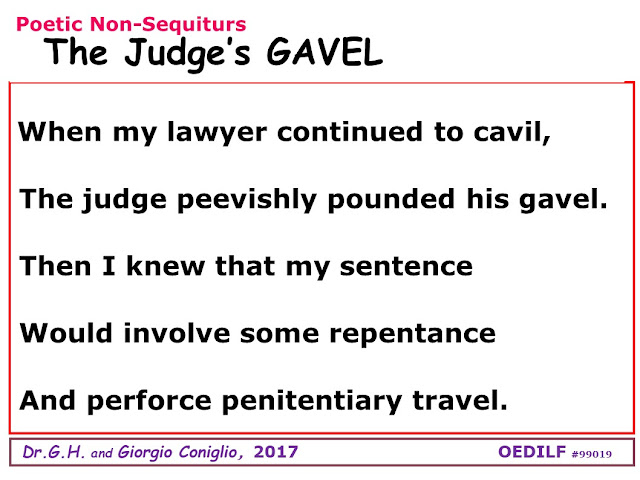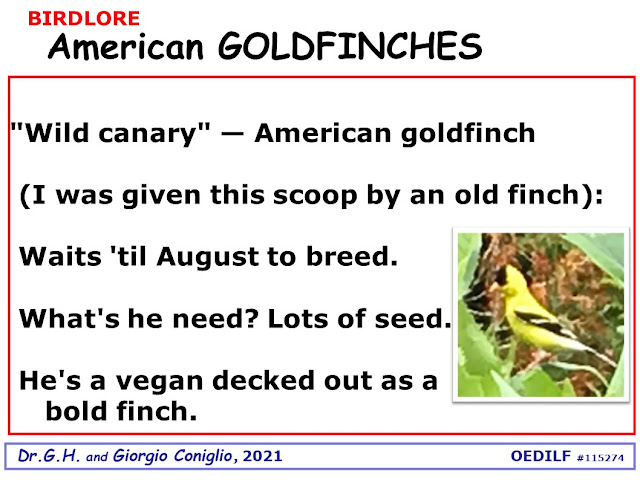CURRENT CONTENTS:
Pass/fail(getting by)
"Hamlet, Prince of Denmark"
"La Belle Dame Sans Merci"
"The Raven"
"Diary of Samuel Pepys"
"A Connecticut Yankee"
"Jabberwocky"
"Paradise Lost"
Authors' Note: During the author's stint as a university science major, a modicum of knowledge of the liberal arts was putatively assured by subjecting students to pass/fail survey courses. "Getting by", as in the above described English class, seemed to be the modus operandi of students, and occasionally of teaching staff.
Authors' Note:
bard: archaic term for a Celtic poet or wandering minstrel, currently applied primarily to the ‘Bard of Avon’, i.e. William Shakespeare
bodkin: a pointed instrument or pin, with archaic use to indicate a stiletto or other dagger
A question asked in Hamlet's most famous soliloquy is …
"Who would fardels bear?"
Fardel is derived from fardeau, the French word for “burden”.
Authors' Note:
rêverie (rehv-uh-REE): French for ‘dream, daydream’
grotesque: term adopted from French for an ancient Roman decorative artform rediscovered in Rome in the 15th century. Grotesques depict fantastical scenes and figures; the related adjective highlights the bizarre and even frightening nature of the images
grot: poetic variant of ‘grotto’
merci (mehr-SEE): French for mercy, forgiveness
The usual critical view is that the protagonist of the poem, transfixed by the 'faery's child', has been trapped and victimized. However, Keats' description in his poem written in 1819 (but taking place in a mythical medieval past), leaves little doubt that the 'Belle Dame' is underage. The societal view of what constitutes child molestation / statutory rape seems to have changed over time.
Authors' Note: Edgar Allan Poe wrote his best-known poem, "The Raven", in 1845. "The lost Lenore", and “quoth the Raven, ‘nevermore’ ” are famous phrases repeated in the poem.
An established classic, the poem will likely remain in the pantheon of poems ad infinitum (evermore).
Authors' Note: The concept for a classic literary satire began in 1884 when author Mark Twain (real name Samuel Clemens) read Le Morte d'Arthur (the Death of Arthur) by Sir Thomas Mallory, a classic romance about the knights of the Round Table.
In Twain’s fictional account, published 1889, action unfolds when Hank, a 19th century munitions-factory mechanic, awakens from a head injury to find himself amidst the sorcerers and knights at Camelot. As he rises to high rank in medieval society through manipulation of modern technology, he becomes known simply as "Boss".

Authors' Note: The noun-form of the adjective essential, used almost exclusively in the plural, exemplifies pluralia tantum, and indicates what is truly needed (Credentials, similarly, is an example of that grammatical curiosity). Paradise Lost, the epic poem about the Fall of Man and the Garden of Eden, by 17th-century English poet John Milton (1608–1674). is contained in twelve books. Its review by young literature students is aided by student guides such as Cliff's Notes.
GENERAL DIRECTIONS FOR WEB-EXPLORERS:
To resume the sequence of daily titillations on our related blog "Daily Illustrated Nonsense", click HERE. Once you arrive, you can select your time frame of interest from the calendar-based listings at the bottom of the page, and check the daily offerings for any month from the start of 2020 until December 2024. As of December 2024, there are 1800 unique entries available on the daily blog, displaying individual poems (often illustrated) and wordplay, but also with some photo-collages and parody song-lyrics. Most of their key elements are also presented here on "Edifying Nonsense" in topic-based collections, such as this one. The "Daily" format also has the advantage of including some song-lyrics, videos and other material that are not shown here on this topic-based blog.

































